Good morning class.
Now that I’m over halfway through the 50-books list, I’ve seen quite a set of characters that stand out. So I’ve chosen my favorites of the bunch. Characters that shock me, make me wonder, thrill me to the bone, terrify me, make me weep, show me how to be myself . . . they’re all here, in alphabetical order (by last name, because after all, this is a class).
- Lyra Belacqua from His Dark Materials Trilogy
I’m almost cheating here—I’ve only finished books one and two of this trilogy, The Golden Compass and The Subtle Knife (blog post pending). But those two books have been enough to show me how amazing this 12-year old girl is. She can lie through her teeth without second guessing herself, fooling every adult enemy that crosses her path, and she is fierce, determined, and brave in every dangerous situation she approaches. She isn’t perfect, though, and her sense of morality is far too black and white (at least at first) to help her make difficult choices. But even when she takes things too far, I can’t help but admire her no-holds-barred heroism against more competent enemies and her unending kindness toward her friends.
- Leopold Bloom from Ulysses
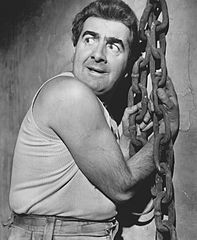
Actor Milo O’Shea as Leopold Bloom in the movie version of “Ulysses” (1967)
With the way I gush about Ulysses, I’m sure this entry doesn’t surprise any of you. As much as I would have liked to have chosen the rambling and coarse Molly Bloom or the moody and literary Stephen Dedalus, my favorite character from Ulysses is the thoughtful, scientific, compassionate Leopold Bloom. He loves animals, embraces his feminine side, and changes the world by acts of kindness. He is a hero—not an ancient hero of physical strength and battle-readiness, but a modern hero of artistic subtlety and active love. The world would be a lot better with men like this.
- Christopher Boone from The Curious Incident of the Dog in the Night-Time
Christopher is the most unique character from any novel I’ve read—not because of his autism, but because of the way his autism is portrayed. We don’t look at him from the outside . . . we look at the rest of the world through his eyes. He shows us how life is like prime numbers, and how animals somehow speak a universal language, and how love is a very tricky thing to define. His life can be difficult to watch, especially when his disability puts his safety in jeopardy, but his story is an amazing one that wouldn’t be half as great without him.
- Daisy Buchanan from The Great Gatsby
Most people who look at The Great Gatsby would be more impressed by Jay Gatsby himself . . . but every time I read this novel I am more and more enamored by Daisy Buchanan. As the love Gatsby is always chasing, and as a close family member of the narrator, she is almost entirely painted in a positive light, and it makes it that much harder to see how terrible she is. She is far too wrapped up in her own rich lifestyle, cares nothing for her daughter, and eventually stoops to murder to punish her husband for his affair, while the murder ultimately gets pinned on Gatsby. But I end up sympathetic to her, for reasons I can’t explain—she is pushed around by the men in her life who care more about their own passions, and she is trapped by the money she married into. I rarely feel so much anger, pain, curiosity, and pity toward a single character.
- Holden Caulfield from The Catcher in the Rye
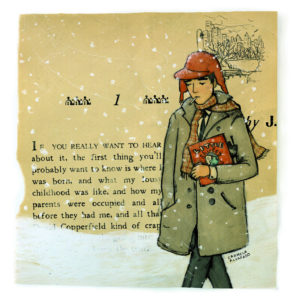
First Lines and an Illustration
Holden is another character I don’t really like—that is, if I met him in person, I would be near him for long. But reading about him is one of the more incredible experiences I’ve had reading a novel, because he is a force to be reckoned with. One never knows what he’ll say next, or what he’ll think in his twisted mind, forcing himself to be an outsider surrounded by “phonies.” But it’s not simply interesting to read his story—his angst is far too relatable, and his compassion (which he does a good job of hiding from readers) is far too powerful. Holden is a scary mirror to look into, but he’s also a touching and comforting hero on the search for happiness like we all are.
- Jean-Louise “Scout” Finch from To Kill a Mockingbird
Again, most people would probably say Atticus Finch, Scout’s father, is their favorite character from this novel; there’s nothing wrong with that, because Atticus is perfect. Even a little too perfect. Scout, on the other hand, is a beautiful mess. She loves reading and hates school, gets in fights to defend her father, and always finds interesting ways to get into trouble. I love watching her transform from a free-spirited, sometimes bratty little girl into someone older . . . not quite an adult, but still someone who gains one of the most mature qualities a person can have: empathy. Her childhood is honest and hilarious to witness, making her easily one of my favorite characters from any novel.
- Samwise Gamgee from The Lord of the Rings Trilogy
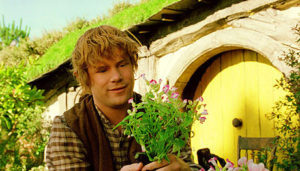
Samwise Gamgee, portrayed by actor Sean Astin in The Lord of the Rings: The Fellowship of the Ring (2001)
Among all the serious and somber heroes from this trilogy, Samwise is the goofy friend and sidekick, and it makes him stand out. But if he was only a fool, he would be no different from Merry and Pippin, who are just as goofy; but Samwise is more than that. Samwise is loyal to Frodo and, in his own comic way, wiser than everyone they meet on their journey. As much as what he does makes me laugh, he does just as much that warms my heart and makes me cheer. Every fantasy story I’ve read or watched since The Lord of the Rings has needed a hero like Frodo and a friend like Sam, or it couldn’t even compare, and I think that says a lot about Samwise himself.
- Hermione Granger from the Harry Potter Series

Emma Watson as Hermione Granger
Speaking of other fantasy stories, I’ll always have a place in my heart for Harry Potter, and I think Harry himself is an amazing hero to lead the series—on par with Frodo. Harry has Ron in the same way Frodo has Samwise, but more importantly, Harry has Hermione. She is brilliant, supportive, and headstrong in their small group of friends. It wasn’t until I grew up and reread the series that I realized how much Hermione did for her friends, and how important she was to the series—not just for the plot, but for feminism and its reputation in fantasy. I can trace my current feminist beliefs back to my first encounters with Hermione, her toughness, her cleverness, and her emotional arc over seven amazing books.
- Pi Patel from Life of Pi
And last but not least is a unique character from a peculiar story. Pi of Life of Pi is hard to describe—he is a heavily religious 16 year-old boy from India, who has an incredible love for stories. It’s possible that his love of stories is what drives him to create a fiction about being trapped on a lifeboat with a tiger, after his entire family dies on a sinking ship in the Pacific. There is no proof that the story is false, though the much more believable story is that he survived without taming a tiger alone on the open sea, so the adult Pi telling this story asks the audacious question: which is the better story? And it’s those that pick the story with the tiger that are the real believers, the real story-tellers, who live a more fulfilled life. For that, Pi’s story is one of my favorites, and Pi is one of my favorite characters because of it.
And that’s my list! I’m still reading Brave New World, so show up for class next time to hear my thoughts.
Until then, enjoy your week!
Prof. Jeffrey

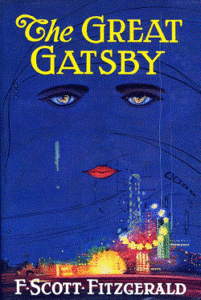 Good morning, class.
Good morning, class.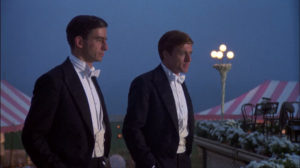
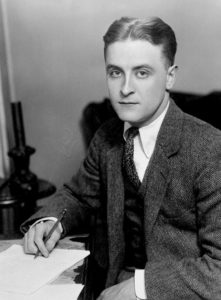
Recent Comments